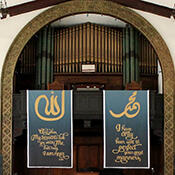 The Prophet Muhammad received his first revelation during an annual devotion at Mount Hira outside of Mecca. The Prophet’s message of tauhid (unity and oneness of God) challenged the polytheistic 7th century Meccan society; Muhammad was met with prosecution. His migration (hijrah) from Mecca to Medina signified the establishment of a model Muslim community and the beginning of the Islamic calendar.
The Prophet Muhammad received his first revelation during an annual devotion at Mount Hira outside of Mecca. The Prophet’s message of tauhid (unity and oneness of God) challenged the polytheistic 7th century Meccan society; Muhammad was met with prosecution. His migration (hijrah) from Mecca to Medina signified the establishment of a model Muslim community and the beginning of the Islamic calendar.
The Prophet Muhammad is both a messenger of God and a personal role model for Muslims. Born in the city of Mecca on the Arabian peninsula in 570 CE, he was raised an orphan in his uncle’s house. He married an older woman, the widow Khadijah, for whom he had worked in the caravan trade. As a merchant, he was known by reputation as al-Amin, the trusted one. When Muhammad was forty years old, he had a profound experience that changed his life and ultimately established the Muslim faith.
Muhammad performed devotions each year on Mount Hira, outside of Mecca. One night during the month of Ramadan, Muhammad reported having a strange encounter while half-asleep in a cave. An angel commanded him, “Recite!” Twice Muhammad asked, “Recite what?” The third time the angel replied: “Read! In the name of your Lord who created: He created man from a clinging form. Read! Your Lord is the Most Bountiful One who taught by [means of] the pen, who taught man what he did not know.” (Qur'an, 96:1-5). Muhammad recited this and then awoke, feeling “as though the words were written on [his] heart.” He ran down the mountain, but he heard a voice from the sky: “Muhammad, you are the Messenger of God, and I am Gabriel.” Looking up, Muhammad saw an angelic form standing astride the horizon, repeating the message.
Muhammad continued to receive revelations, which he recited to his wife and followers as a small group of believers began to grow in Mecca. The message he received was a warning of divine judgment and an invitation to return to the ways of the earlier prophets, including Abraham, Moses and Jesus. These revelations challenged the foundations of 7th century Meccan society. Mecca was the pilgrimage site of the polytheistic Arabian religion, the center of which was the Ka’bah, a central cube-shaped structure which housed over 360 idols. In this polytheistic world, Muhammad spoke of tauhid, the unity and oneness of God. Where tribal bonds and blood feuds pervaded the social structure, the Prophet spoke of a universal community, or ummah. The revelation Muhammad received demanded social justice and reform: one should not only perform regular prayers, but also care for the poor and the weak.
The small community of Muslims was met with harsh and continual persecution. In 622 CE, the Prophet and his followers emigrated north from Mecca to Medina. This event, known as the hijrah, marks the establishment of the model Islamic community and thus the beginning of the Muslim calendar. Through an elective process, the Prophet became the temporal and spiritual leader of Medina, establishing order and unity in a town suffering from political turmoil. Muhammad continued to receive revelations from God in Medina, and the message spread. In 630 CE, after a series of military battles and negotiations with enemies in Mecca, Muhammad returned to the city victorious. Many Meccans embraced Islam, and the Prophet rededicated the Ka’bah to the worship of the one God. By the time of the Prophet’s death in 632 CE, much of the Arabian peninsula had embraced Islam.
After Muhammad died, his community preserved the memory of what he did and said as the best example of how to live in response to God’s will. The records of the Prophet’s words were later collected in books of traditions, or hadith; these are a part of the Sunnah of the Prophet, which include his words and practice. The Sunnah serves as a reminder of how to follow God’s will in daily life. Most Muslims are careful to insist, however, that “Muhammad is no more than a messenger” (Qur'an 3:144), and not a divine being. When Muslims refer to the Prophet Muhammad, to show reverence, his name is often followed by the phrase “salla llahu alayhi wa sallam” meaning “May the prayers and peace of God be upon him.” In writing, this may be abbreviated as (sa), SAW, or PBUH meaning “peace be upon him,” while in other cases the calligraphic Arabic form is written.